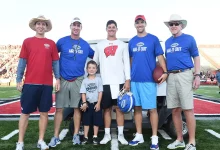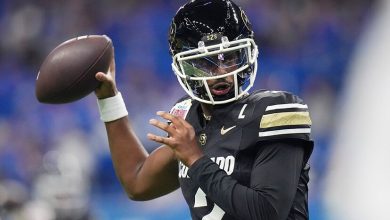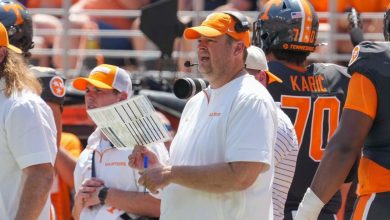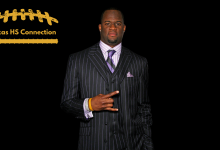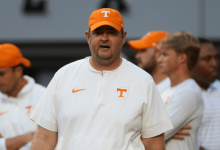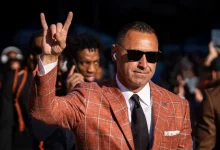Georgia’s Kirby Smart ranked fourth among the best college football head coaches of the 2000s, praised for dominance and consistency.
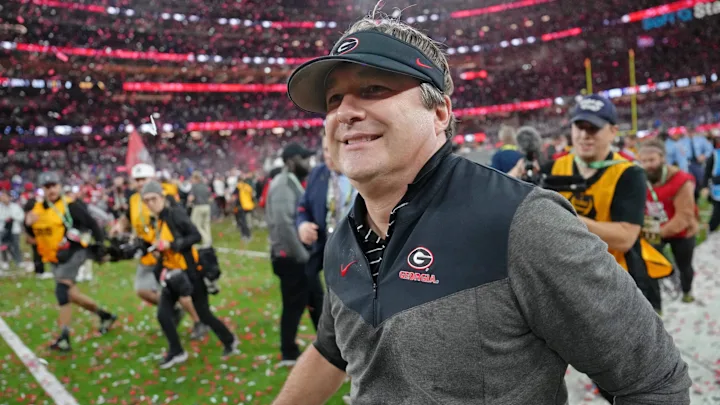
Kirby Smart, the head coach of the Georgia Bulldogs, has been ranked as the fourth-best college football head coach of the 2000s, an accolade that cements his place among the sport’s modern-day legends. The ranking, released as part of a comprehensive retrospective of the last quarter-century in college football, places Smart in elite company alongside coaching giants such as Nick Saban, Urban Meyer, and Dabo Swinney.
For Georgia fans, the recognition is well deserved. Smart’s achievements since taking the reins in Athens in 2016 have not only redefined the program but also altered the national landscape of college football. His blend of relentless recruiting, strategic brilliance, and player development has turned Georgia into a perennial championship contender and a model of sustained excellence.
This article dives into why Smart’s ranking is significant, what distinguishes him from his peers, the turning points of his coaching journey, and what this honor means for Georgia football now and moving forward.
The Ranking Criteria: Excellence, Longevity, and Impact
The rankings evaluated coaches based on several key factors:
- National championships and playoff success
- Winning percentage
- Program-building and consistency
- Recruiting excellence
- Player development and NFL output
- Cultural impact and coaching tree influence
Kirby Smart’s body of work checks every box. With two national championships (2021 and 2022), multiple College Football Playoff appearances, and a winning percentage over 85%, Smart’s rise from defensive coordinator under Nick Saban to the face of Georgia football is nothing short of remarkable.
From Athens Native to Athens King
Born in Montgomery, Alabama, and raised in Bainbridge, Georgia, Smart has deep roots in the South. After playing defensive back for Georgia in the 1990s, he embarked on a coaching career that included stints at Valdosta State, LSU, and the NFL’s Miami Dolphins before rejoining Saban at Alabama in 2007.
As Alabama’s defensive coordinator, Smart became one of the most respected assistants in the country, helping the Crimson Tide win four national titles. But his dream job was always in Athens.
When Georgia hired Smart in 2015 following the departure of longtime head coach Mark Richt, expectations were sky-high. But few predicted how quickly he would turn a good program into a dominant one.
Early Years: Building the Foundation
Smart’s first season in 2016 was a modest 8–5 campaign, a transition year that revealed the growing pains of a culture shift. But from 2017 onward, the results have been undeniable.
The 2017 team nearly won it all, falling to Alabama in overtime of the national title game. That season marked a turning point — Georgia wasn’t just competing in the SEC; it was leading the charge.
Smart’s recruiting immediately elevated the program. Georgia began stacking No. 1 and No. 2 recruiting classes, bringing in future NFL stars like Roquan Smith, D’Andre Swift, and Andrew Thomas. That talent influx laid the groundwork for the championship runs to come.
The Back-to-Back Era: 2021 and 2022
Georgia’s 2021 national championship broke a 41-year drought and rewrote the program’s narrative. Powered by a generational defense — arguably the best in college football history — and a poised quarterback in Stetson Bennett, the Bulldogs went 14–1 and exorcised past demons by defeating Alabama in the national title game.
In 2022, they followed it up with a perfect 15–0 season and another national championship, capped by a 65–7 demolition of TCU in the CFP title game. It was a statement of dominance rarely seen in the sport’s modern era.
Smart became only the second coach in the CFP era to win back-to-back national championships, joining his mentor Nick Saban in rarefied air.
What Separates Smart from the Pack?
While other top coaches have won big, what sets Kirby Smart apart is the completeness of his approach:
1. Relentless Recruiting
Georgia has ranked in the top three nationally in recruiting almost every year under Smart. He doesn’t just land stars — he builds depth across every position group.
2. Elite Defense as a Brand
Smart’s background in defense shows in Georgia’s identity. Even in an era of offensive fireworks, the Bulldogs consistently rank among the best in scoring defense, run defense, and total defense.
3. Development to the NFL
Smart’s program doesn’t just win on Saturdays — it produces pros. Georgia has become an NFL factory, especially on defense, with players like Travon Walker, Jordan Davis, Nakobe Dean, and Jalen Carter becoming early-round draft picks.
4. Consistency at the Top
Since 2017, Georgia has averaged 12 wins per season. The Bulldogs have played in six consecutive New Year’s Six bowls, reached three national title games, and won two championships.
5. Culture and Accountability
Smart has instilled a no-nonsense, process-oriented culture that blends discipline with motivation. Players describe him as intense, prepared, and deeply committed to their growth on and off the field.
Coaching Tree and Legacy
Another reason Smart ranks so highly on this list is the coaching tree he’s building. Former assistants and analysts from his staff have gone on to prominent roles across college football, much like the “Saban tree” that produced him.
By creating a strong infrastructure of development — not just for players, but for staff — Smart is building a sustainable model that could define Georgia football for decades.
Comparing the Top Four: Where Smart Stands
- Nick Saban (Alabama) – Seven national championships, the undisputed GOAT of the modern era.
- Urban Meyer (Florida, Ohio State) – Three national championships, known for rapid program turnarounds.
- Dabo Swinney (Clemson) – Two national championships, built Clemson into a powerhouse with a distinct identity.
- Kirby Smart (Georgia) – Two national championships (so far), unmatched defensive dominance, and best active recruiting streak.
While Saban’s resume is still the gold standard, Smart is arguably the most complete coach in the country right now. His trajectory suggests that, with more time, he could climb even higher in these rankings.
What’s Next for Smart and Georgia?
Smart is still only in his late 40s. That’s younger than Saban was when he started his dynasty at Alabama. With no signs of slowing down and a contract that keeps him in Athens through 2031, Smart has the time, resources, and support to continue building a dynasty.
Georgia’s 2025 roster is again stacked with talent. Top-tier quarterback play, elite offensive line depth, and a defense loaded with future NFL stars make the Bulldogs one of the favorites for another CFP run.
If Smart adds a third national championship in the next few years, he could reasonably leapfrog Swinney and even Meyer in these rankings. With the expanded 12-team College Football Playoff debuting this season, Georgia is expected to be a fixture in the new postseason format — increasing Smart’s odds of further adding to his trophy case.
Final Thoughts: A Legacy Still in Motion
Being ranked fourth among the best college football head coaches of the 2000s is a major milestone for Kirby Smart. But in many ways, his story is still being written.
He has already cemented himself as the greatest coach in Georgia football history. Now, the challenge is to sustain that greatness — to move from a two-time champion to an all-time dynasty builder.
If history is any guide, Smart is more than up to the task. The work ethic, leadership, and vision he brings to Georgia have made the Bulldogs the envy of college football. And while Saban’s shadow still looms large, Smart is proving that it’s possible to emerge from it and carve a historic legacy of his own.
For Georgia fans, the message is clear: The Dawgs are in good hands — not just now, but for years to come. And Kirby Smart is just getting started.


